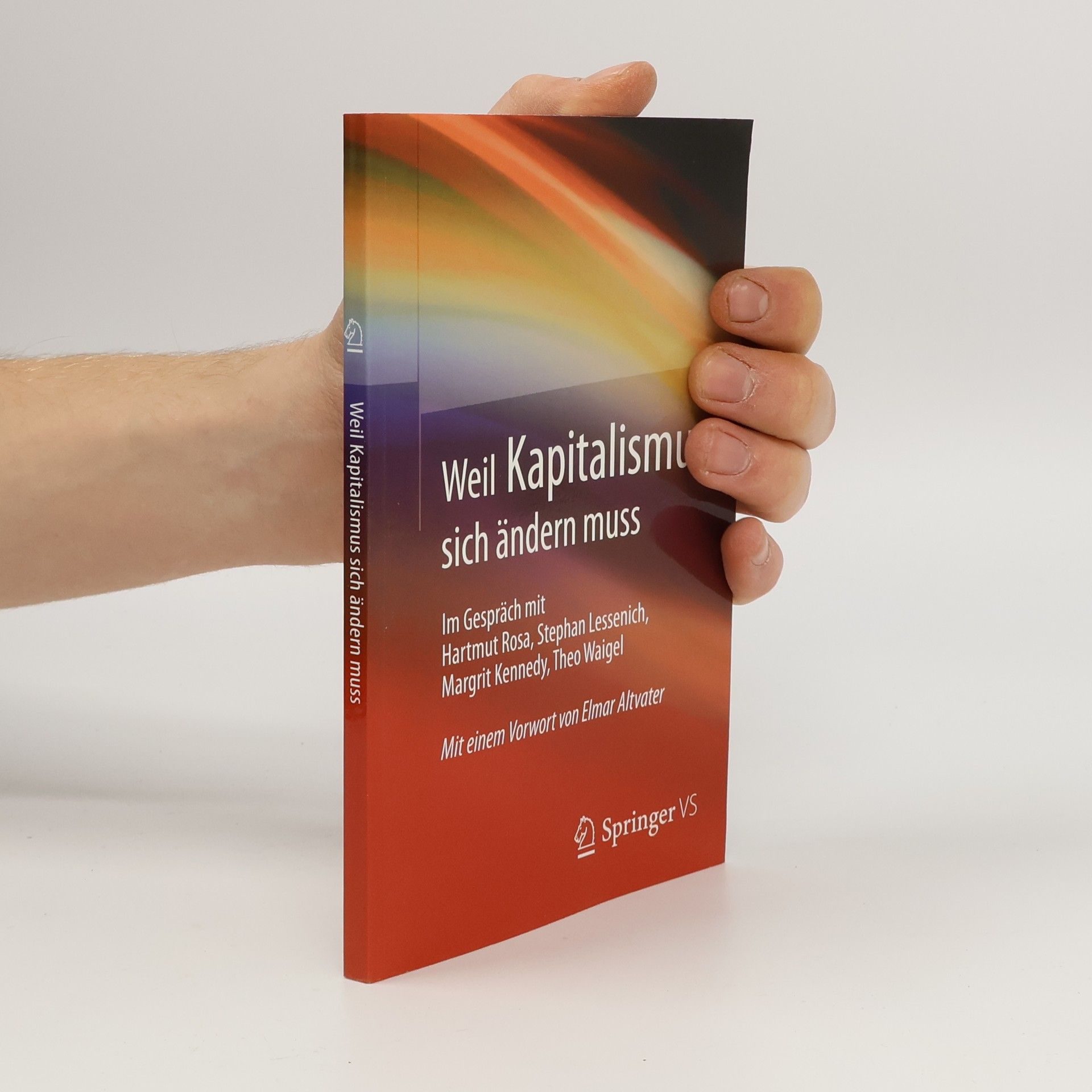Exploring the implications of aging in contemporary societies, this open access book combines insights from psychology, gerontology, and sociology. It offers a multifaceted perspective on old age, challenging conventional notions of aging as a negative phenomenon. By examining the societal aspects of aging, the book provides a comprehensive understanding of how societies can experience aging collectively and its potential impacts.
Stephan Lessenich Book order (chronological)
Stephan Lessenich is a sociologist focusing on society in the post-growth era. His work examines the social and political consequences of perpetual economic expansion. Lessenich analyzes how the culture of continuous growth shapes us and what strategies we can employ to overcome it. He emphasizes critical thinking and the pursuit of alternative societal models.






Gesellschaften unter Handlungszwang
Existenzielle Probleme, Normalität und Kritik
Klimawandel, Armutsmigration, Krieg: Wir stehen vor einer ganzen Reihe existenzieller Probleme, die spätmoderne Gesellschaften ebenso herausfordern wie deren Gesellschaftswissenschaften – und beide allem Anschein nach überfordern. Der Band fragt danach, wie der Problemschwere zunächst wissenschaftlich, sodann aber auch gesellschaftlich überhaupt Rechnung zu tragen wäre: Was bräuchte es, um den existenziellen Charakter von Problemen zu realisieren, also zum einen zu erkennen, zum anderen aber auch zur Leitlinie des eigenen Handelns zu machen? Was verhindert die so verstandene Realisierung der großen Fragen unserer Zeit? Und wie wäre es um die überkommenen Formen gesellschaftlicher Normalitätsproduktion bestellt, wenn existenzielle Probleme als solche anerkannt und angegangen würden? Das Buch ist als Debattenband konzipiert, in dem die Herausgeber auf kritische Repliken zu ihren jeweiligen Positionen gemeinsam Stellung beziehen.
Altern als Zukunft eine Studie der VolkswagenStiftung
- 192 pages
- 7 hours of reading
Die demografische Entwicklung in Deutschland wirft zentrale Fragen auf: Was bedeutet das Altern der Gesellschaft für das soziale, wirtschaftliche und politische Leben? Das Buch beleuchtet die Herausforderungen und Chancen, die mit einer älter werdenden Bevölkerung einhergehen. Es werden verschiedene Perspektiven und Ansätze vorgestellt, um den Wandel aktiv zu gestalten und die Lebensqualität für alle Generationen zu sichern. Die Analyse umfasst Aspekte wie Pflege, Bildung, Integration und die Rolle der älteren Menschen in der Gesellschaft.
Nicht mehr normal
Gesellschaft am Rande des Nervenzusammenbruchs
Wie geht eine Gesellschaft damit um, dass nichts mehr normal ist? Der Soziologe Stephan Lessenich zeigt, wie die Überwindung einer überholten Normalität gelingen kann. Die Welt befindet sich im permanenten Ausnahmezustand. Nach der Finanzkrise, der Migrationskrise, der Klimakrise hat die Coronakrise den Alltag jedes Einzelnen erfasst. Und dann gibt es auch noch Krieg in Europa. Es wird immer deutlicher, dass die bewährte Normalität, nach der wir uns sehnen, nicht mehr zurückkehren wird. Stattdessen herrscht allgemeine Verunsicherung. Mit klarem Blick analysiert Stephan Lessenich die Reaktion unserer Gesellschaft auf ihre Krisen und denkt über die Fragen nach, die uns alle umtreiben. Wenn die alte Normalität nicht mehr trägt und auch nicht mehr zu ertragen ist: Was tritt dann an ihre Stelle? Und welche Dynamiken setzen ein, wenn gesellschaftliche Mehrheiten sich an Gewissheiten klammern, die immer drängender in Frage gestellt werden?
Ob im Supermarkt, in der Shoppingmall oder im Internet - unser Alltag ist geprägt von ständig verfügbaren Waren und Konsumgütern. Sie sind Teil eines globalen Systems, in dem Rohstoffe gefördert und zu Gütern verarbeitet werden, die wiederum konsumiert und schließlich entsorgt werden müssen. Selten sehen wir dabei mehr als das fertige Produkt. Die in diesem Band versammelten Fotoarbeiten und Texte leuchten hinter die Kulissen. Sie zeigen, woher das Coltan für unsere Smartphones kommt oder wie das Gemüse auf unsere Teller und der Used Look in unsere Jeans gelangt. Dabei wird deutlich: Den Preis für Massenkonsum und Lebensstil in den Wohlstandsgesellschaften zahlen Menschen an anderen Orten dieser Welt - in Form von Ausbeutung, elenden Arbeitsbedingungen und fortschreitender Umweltzerstörung.
Suhrkamp Taschenbuch Wissenschaft: Was stimmt nicht mit der Demokratie?
Eine Debatte mit Klaus Dörre, Nancy Fraser, Stephan Lessenich und Hartmut Rosa. Herausgegeben von Hanna Ketterer und Karina Becker
- 271 pages
- 10 hours of reading
Angesichts der gegenwärtigen ökonomischen, ökologischen und sozialen Krisen zeichnet sich ab, dass die Wachstumsdynamik moderner Gesellschaften nicht mehr stabilisierend wirkt, sondern selbst zum Krisentreiber geworden ist. In diesem Band diskutieren die Philosophin Nancy Fraser und die Soziologen Klaus Dörre, Stephan Lessenich und Hartmut Rosa, was dies für die Gegenwart und die Zukunft der Demokratie bedeutet und welche Konzeptionen und Wege hin zu einer demokratischen Transformation vorstellbar sind. Aus ihrer demokratietheoretischen Perspektive intervenieren Viviana Asara, Banu Bargu, Ingolfur Blühdorn, Robin Celikates, Lisa Herzog, Brian Milstein, Michelle Williams und Christos Zografos.
Grenzen der Demokratie
Teilhabe als Verteilungsproblem. [Was bedeutet das alles?]
Demokratie ist ein allseits anerkannter Hochwertbegriff, möglicherweise der Hochwertbegriff der westlichen Moderne überhaupt. Aber die real existierende Demokratie ist auch ein System der Grenzziehungen – der sozialen Ausgrenzungen ebenso wie der ökologischen Entgrenzungen. Vor dem Hintergrund dieser Einsicht entwirft Stephan Lessenich Perspektiven für eine solidarische, inklusive und nachhaltige Demokratie.
Neben uns die Sintflut
Wie wir auf Kosten anderer leben
Im Grunde wissen wir es alle: Uns im Westen geht es gut, weil es den meisten Menschen anderswo schlecht geht. Doch nur zu gerne verdrängen wir unseren Anteil an dem sozialen Versagen unserer Weltordnung. Der renommierte Soziologe Stephan Lessenich bietet eine sehr konkrete und politisch brisante Analyse der Abhängigkeits- und Ausbeutungsverhältnisse der globalisierten Wirtschaft. Anders, als wir noch immer glauben möchten, profitieren nicht alle irgendwie von freien Märkten. Die Wahrheit ist: Wenn einer gewinnt, verlieren andere. Und jeder von uns ist ein verantwortlicher Akteur in diesem Nullsummenspiel, dessen Verlierer jetzt an unsere Türen klopfen. Für die Taschenbuchausgabe wurde das Buch umfassend aktualisiert und überarbeitet.
Weil Kapitalismus sich ändern muss
- 137 pages
- 5 hours of reading
Die Kritik am Kapitalismus hat spätestens mit der Finanz- und Wirtschaftskrise eine Renaissance erfahren. Gibt es Grenzen des ökonomischen Wachstums? Sind kontrollierte Kapitalmärkte, ein gerechteres Steuersystem oder die Einführung eines bedingungslosen Grundeinkommens darauf gerechte Antworten? Diese und andere Fragen diskutieren die Sozialwissenschaftler Hartmut Rosa und Stephan Lessenich, die Währungsexpertin Margrit Kennedy und der Politiker Theo Waigel. Eingeleitet werden die Interviews mit einem Kommentar des Politikwissenschaftlers und Kapitalismuskritikers Elmar Altvater.


